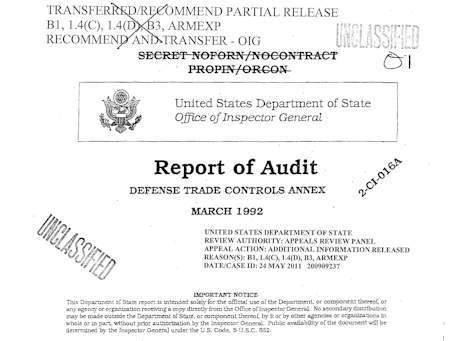In March of 1992 US State Department inspector general Sherman Funk issued a classified report about illegal Israeli transfers of US military technology. The report finds Israel "is systematically violating U.S. arms control laws." The "Blue Lantern" system used in-country checks conducted by Customs officials or other qualified US embassy personnel to verify that "sensitive U.S. Munitions List items and technology are used only for authorized purposes."
The audit uncovered a breakdown in US inspection regimes. The State Department relied on "government to government" assurances that items were not "retransferred" or "used for unauthorized purposes." Shipments to non-government entities could only be checked if Israeli government officials granted permission.
The auditor found "After reviewing the end use procedures, we stated to post officials that relying entirely on government-to-government assurances is an inadequate verification procedure. This is especially true for a country which, according to numerous intelligence reports, is systematically violating U.S. arms control laws." But the US State Department's own Bureau of Politico-Military Affairs (PM) reined in Blue Lantern investigators stating "investigations were generally not to be conducted unless authorized." One Blue Lantern audit found US telemetry equipment being put to prohibited uses. When notified, the State Department's Directorate of Defense Trade Control refused to take action and closed the Blue Lantern case.
At the time, the executive and some members of the legislative branch were deeply concerned about the ongoing Israeli diversion to China of military technology from the controversial American-funded Lavi jet fighter project. Secretary of State James A. Baker Baker was also holding up an Israeli request for $10 billion in loan guarantees to pressure the Israelis to halt construction of illegal settlements on the West Bank. Report of Audit reveals a highly dysfunctional inspection regime dominated by political infighting. An attached memo from the Bureau of Politico-Military Affairs (PM) challenged the inspector general's premises. "There are two glaring deficiencies in this section. First, the report is premised on two notions; that if a story appears in an intelligence publication, it must be true; that if some agency not charged with responsibility for a program (in this case low level officials in ACDA) [U.S. Arms Control and Disarmament Agency], they must be correct. As is indicated below, these assumptions do not always pertain. It is not PM's job to react in a knee-jerk fashion to intelligence reports, but to analyze and investigate."
Release notes. On August 14, 2009 the US State Department "denied in full" IRmep's February 14, 2009 Freedom of Information Act request for the Funk audit. IRmep appealed twice to the US Department of State Appeals Review Panel, winning a redacted release on August 1, 2011. IRmep then appealed that Israel, the subject of the entire report, be restored to all areas of the document where State Department censors redacted the country reference. On September 28, 2011 the State Department refused, responding that "the decision of the Appeals Review Panel is the final decision for the Department of State. Your only available option is litigation." The Wall Street Journal allegedly obtained the report in 1992, but never made it available to the public.
| Document/File Date | Contents |
| March of 1992 (PDF) |
Report of
Audit - Defense Controls Annex, 2-CI-016A United States
Department of State Office of Inspector General, Sherman M. Funk
- 3.2 MB
|


No comments:
Post a Comment